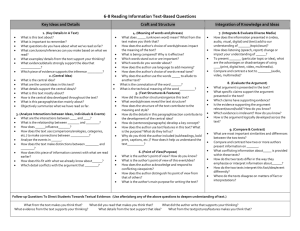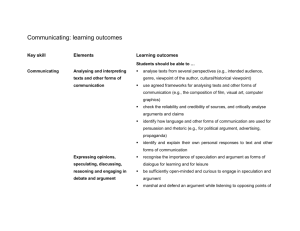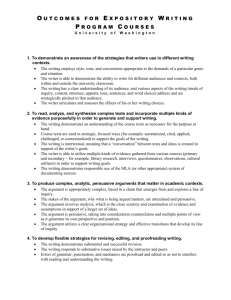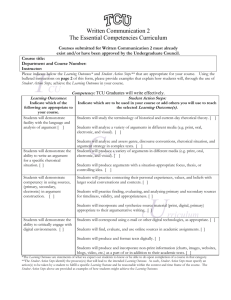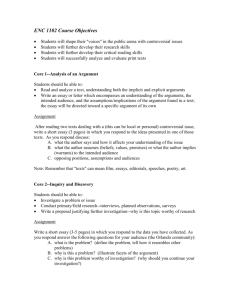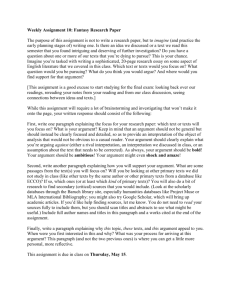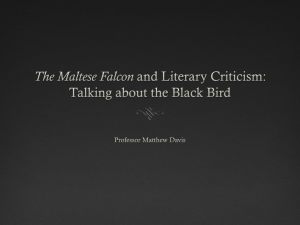English 440: Seminar in Theory: Cultural Categories
advertisement
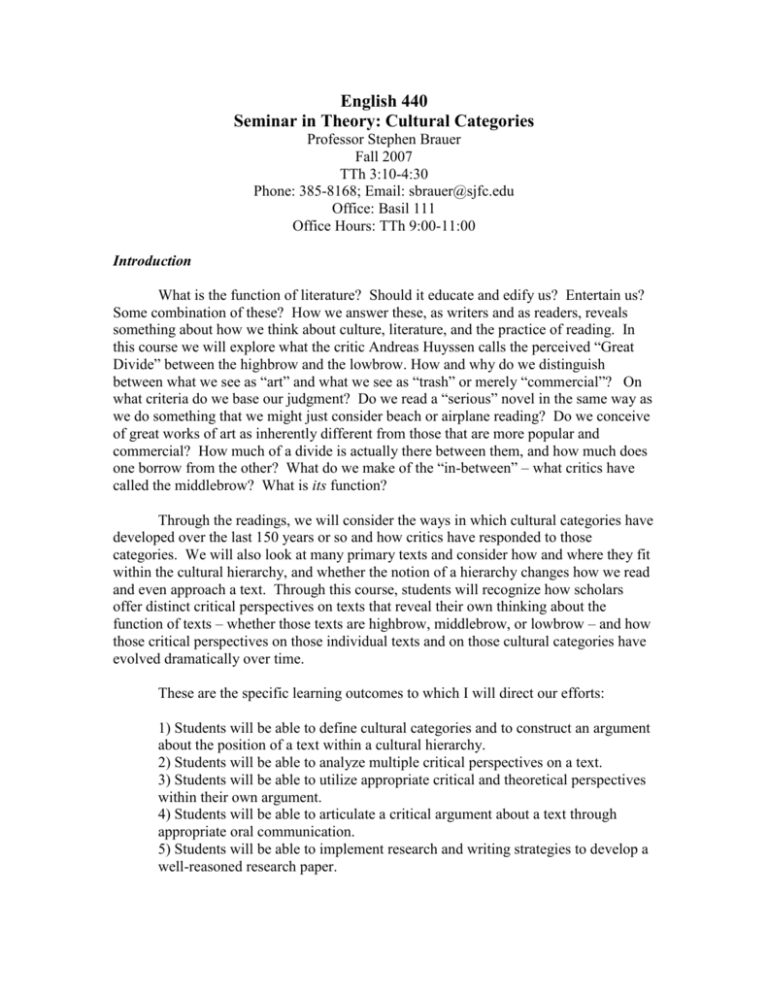
English 440 Seminar in Theory: Cultural Categories Professor Stephen Brauer Fall 2007 TTh 3:10-4:30 Phone: 385-8168; Email: sbrauer@sjfc.edu Office: Basil 111 Office Hours: TTh 9:00-11:00 Introduction What is the function of literature? Should it educate and edify us? Entertain us? Some combination of these? How we answer these, as writers and as readers, reveals something about how we think about culture, literature, and the practice of reading. In this course we will explore what the critic Andreas Huyssen calls the perceived “Great Divide” between the highbrow and the lowbrow. How and why do we distinguish between what we see as “art” and what we see as “trash” or merely “commercial”? On what criteria do we base our judgment? Do we read a “serious” novel in the same way as we do something that we might just consider beach or airplane reading? Do we conceive of great works of art as inherently different from those that are more popular and commercial? How much of a divide is actually there between them, and how much does one borrow from the other? What do we make of the “in-between” – what critics have called the middlebrow? What is its function? Through the readings, we will consider the ways in which cultural categories have developed over the last 150 years or so and how critics have responded to those categories. We will also look at many primary texts and consider how and where they fit within the cultural hierarchy, and whether the notion of a hierarchy changes how we read and even approach a text. Through this course, students will recognize how scholars offer distinct critical perspectives on texts that reveal their own thinking about the function of texts – whether those texts are highbrow, middlebrow, or lowbrow – and how those critical perspectives on those individual texts and on those cultural categories have evolved dramatically over time. These are the specific learning outcomes to which I will direct our efforts: 1) Students will be able to define cultural categories and to construct an argument about the position of a text within a cultural hierarchy. 2) Students will be able to analyze multiple critical perspectives on a text. 3) Students will be able to utilize appropriate critical and theoretical perspectives within their own argument. 4) Students will be able to articulate a critical argument about a text through appropriate oral communication. 5) Students will be able to implement research and writing strategies to develop a well-reasoned research paper. Required Texts Agatha Christie, Murder on the Orient Express Dashiell Hammett, The Maltese Falcon Jonathan Lethem, Motherless Brooklyn Thomas Pynchon, The Crying of Lot 49 Harriet Beecher Stowe, Uncle Tom’s Cabin There will also be a number of essays that will be available through our Blackboard site. Be sure to keep up to date on this site. Course Requirements Graded Assignments – There will be three shorter papers, an in-class presentation, and an extended research paper. Reading Assignments – Read the texts and come to class with ideas about what you’ve read. Preparation will count toward your grade and, in a class of this size, it’s pretty easy to tell who is prepared and who isn’t. Let me know any time that you are struggling with the material. Participation in Class Discussions – Although there will be times that I lay out historical and cultural contexts for the texts, this course is a discussion-based class. Your participation is key. The success of discussions will rely upon your preparation, your ability to listen to others, and your willingness and desire to participate. Absences – Four unexcused absences will result in a failing grade. If you cannot make it please get a note from a doctor or nurse. Other Issues Grading – Your final grade will be 10% Text Preparation and Class Participation, 35% Short Papers, 15% Presentation, 40% Research Paper. Plagiarism – Plagiarism is a very serious offense, and one I will handle with the utmost gravity. Plagiarism is the unauthorized, undocumented use of another person’s words or ideas – and it is a violation of college guidelines. Plagiarism will certainly result in a zero for that written assignment, may result in failing the course, and, in some cases, may result in suspension or expulsion from the college. Be absolutely sure to cite any sources that you use in a writing assignment and to include a Works Cited List for those sources. Disabilities – Students with documented learning, physical, or emotional disabilities/conditions should identify themselves to me after the first class so that we can accommodate your needs. Schedule of Assignments September 4 – Introductions. September 6 – R. Gordon Kelly, “Literature and the Historian” September 11 – Jonathan Culler, “Beyond Interpretation” September 13 – M.H. Abrams, “How to Do Things with Texts” September 18 – Stanley Fish, “Is There a Text in This Class?” September 20 – First Paper due. September 25 – Harriet Beecher Stowe, Uncle Tom’s Cabin (Ch. I-XVIII) September 27 – Harriet Beecher Stowe, Uncle Tom’s Cabin (Ch. XIX-XXVIII) October 2 – Harriet Beecher Stowe, Uncle Tom’s Cabin (Ch. XXIX-XLV) October 4 – Historical criticism of UTC (p. 459-494) October 9 – Modern criticism of UTC (p. 495-542) October 11 – Modern criticism of UTC (p. 542-584) October 16 – Agatha Christie, Murder on the Orient Express October 18– Agatha Christie, Murder on the Orient Express. Paper on UTC due. October 23 – Dashiell Hammett, The Maltese Falcon October 25– Dashiell Hammett, The Maltese Falcon October 30 – Thomas Pynchon, The Crying of Lot 49 November 1 – Thomas Pynchon, The Crying of Lot 49 November 6 – Critical Review of Christie or Hammett due. November 8 – Jonathan Lethem, Motherless Brooklyn November 13 – Jonathan Lethem, Motherless Brooklyn November 15 – Annotated Bibliography for Final Project due. November 20 – Preparation for Final Project. November 22 – THANKSGIVING BREAK November 27 – Presentations November 29 – Presentations December 4 – Presentations December 6 – Presentations Research Paper due during Exam week. Criteria for Grading Grade: A 1. The student offers a focused and unusually perceptive argument, supported by relevant and accurate evidence, and acknowledges other possible interpretations of the material while making a persuasive case for his/her own interpretation. The writing is clear and correct, the organization is logical and coherent, and the diction is sophisticated and appropriate for the topic. Grade: B 1. The student offers a focused argument, supported by relevant and accurate evidence, and acknowledges and addresses other possible interpretations of the material. 2. Problems with organization at times obscure the argument. 3. Errors in grammar, usage, spelling, and punctuation interfere with the clarity of the writing. Grade: C 1. The student offers an argument, but supporting evidence is ·Missing ·Not applicable ·Not sufficiently specific ·Obscured by errors in language and usage 2. The student offers an argument that address the topic, but it is too general or obvious 3. The student offers an argument that address the topic, but the supporting evidence is not convincing or clearly organized, and transitions between ideas (both within and between paragraphs) are missing Grade: D 1. The student merely summarizes or describes a topic or question without offering an argument 2. The student offers an argument, but one that does not address the topic or question 3. The essay is difficult to read due to errors in language and usage Grade: F 1. The student has made serious factual errors 2. The student completely ignores the topic or question 3. The essay is incomprehensible owing to errors in language and usage 4. The essay is academically dishonest Assignments – Short opening paper: What is the function of reading? Consider reading practices and questions in the context of the theorists and critics we’ve read in the opening two weeks. 2-3 pages. Paper on UTC: Construct an argument about the novel in the context of the different critical perspectives/write an analysis of the critical reception of the novel. 5-6 pages. Critical review of Hammett/Christie: Trace the critical reception of the novel from its publication to the present and summarize the nature of that reception. Four sources, 5-6 pages. Annotated Bibliography – 5 sources, with 1-2 paragraphs of analysis of each source. Novelists to choose from: Margery Allingham John Dickson Carr Raymond Chandler Agatha Christie Carroll John Daly Dashiell Hammett Michael Innes Ronald Knox Ellery Queen Dorothy Sayers Rex Stout S. S. Van Dine
